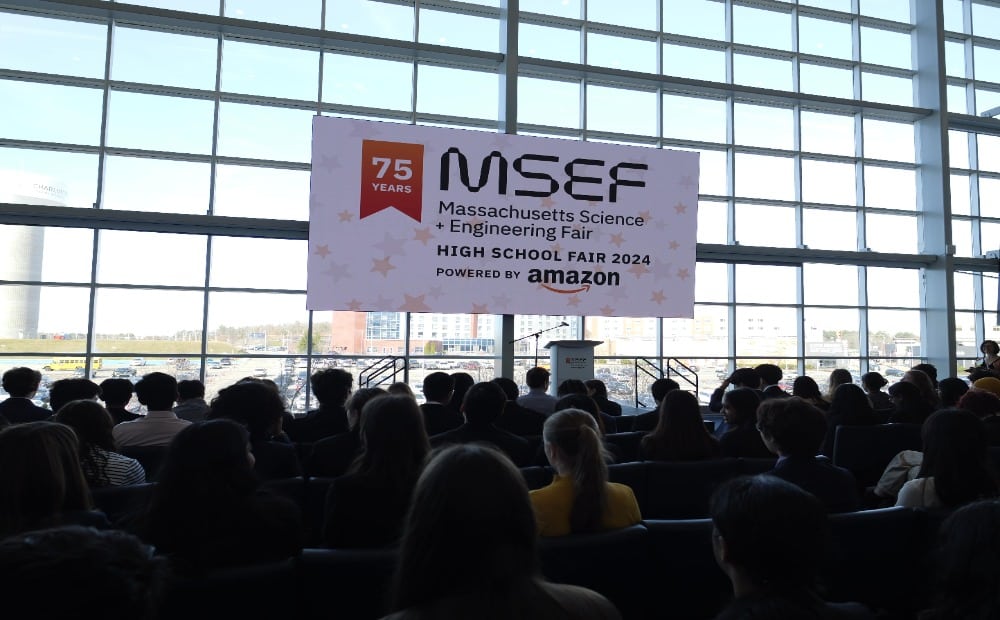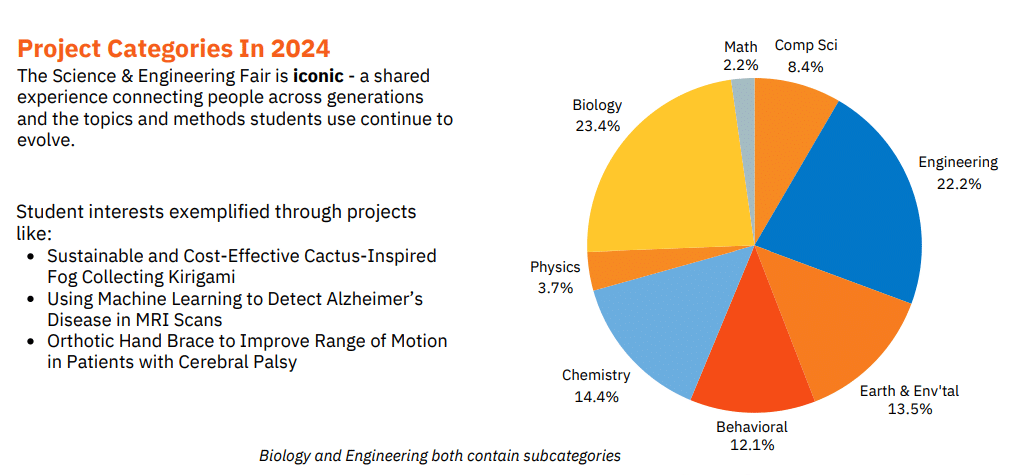I’m a big fan of science fairs. They are a fantastic opportunity for students to gain hands-on experience in all aspects of research and presentation. Whether at the school, regional, state, or national level, these events allow students to conceive, research, execute, and present a project on a topic that interests them. Along the way, students are exposed to mentorship from adults and peers, develop critical time management skills, build communication abilities, and explore potential college and career paths. Plus, it can be a lot of fun!
Today’s science fair projects span a wide range of fascinating topics, including environmental science experiments, AI, biomedical engineering, and behavioral science. So, I especially enjoyed talking with Martha Johnson, Student Programs Coordinator for the Massachusetts Science & Engineering Fair (MSEF), about this venerable science fair and how students can participate.

What is the Massachusetts Science & Engineering Fair?
Two things surprised me about MSEF right from the start. First, it’s been around for a long time! The fair started in 1949, spearheaded by the American Academy of Arts & Sciences, a group of MIT professors, and some pioneering K-12 science educators who—even at that time—wished to nurture greater interest in the sciences among students. MSEF has been running the state science fair ever since, and over the decades, it has evolved along with the state’s science and tech-heavy economy.
But MSEF does much more than just host the annual fair. It provides valuable workshops, leadership opportunities, and scholarship connections for students. For teachers, the organization offers professional development, curriculum resources, and its free “Getting Science Fair Ready” program. The MSEF also trains judges to provide constructive, encouraging, and thoughtful feedback to participating students.
Who Can Participate?
The fair is open to all 6th – 12th grade students in Massachusetts from public, private, and home-schooling settings. All students are welcome to participate free of charge, with the support of their schools. MSEF is currently working with 187 schools, supporting around 3000 students across the state.
“The project I did this year helped me figure out what I want to do when I go to college. It took me forever to figure it out, but my science fair project became like a passion project for me, and I realized that I really enjoyed biomedical engineering…. One judge I met turned out to be working at a WPI lab and ended up connecting me with that lab. Other judges gave me thoughtful feedback about how I could improve the device and what aspects of it worked or didn’t work.” – High School Student
The Path to the Science Fair
The fair takes place in the spring, and most students start planning their projects the previous fall or summer, although some students take on multi-year projects and work on them all year round. All participants in the state science fair must have school permission to participate, and there are special provisions for homeschoolers and other special situations. While many students work individually, there are teams in middle and high school categories.
Students whose schools already have a science fair program should contact their science teacher to get started. Those without an existing program can contact MSEF at [email protected] for guidance on eligibility and next steps.

The Student Experience
A science or engineering fair project allows students to deeply investigate a topic they are passionate about using the same scientific methods or engineering design processes as professionals. Visit the Student section of the MSEF’s website to get inspiration and learn about the process. View the titles of past winning projects. Through Science Fair, students have the ability to dive into areas of interest, make meaningful connections with peers, and even get matched with STEM professionals who can support students in their pursuit of STEM knowledge!
The journey to the state fair begins with students presenting their projects at a school fair or showcase. They may then progress to one of 12 regional fairs before reaching the state competition. Regardless of how far they advance, students develop critical skills in areas like critical thinking, data analysis, problem-solving, communication, and time management. Just as importantly, they gain confidence and a sense of belonging to a supportive STEM community.
In fact, a whopping 94% of students said the science fair experience increased their interest in STEM careers. The MSEF also operates a mentorship program, pairing students with STEM professionals who can provide guidance on their projects and future academic and professional paths.
So many people want to help students along their project journey, including mentors, teachers, and the MSEF Staff. Students who reach out form strong relationships with their mentors that can help them well beyond the context of the science fair, providing a powerful demonstration of the supportive relationships that can help them in their academic and professional future.
“Science Fair has taught me the value of perseverance and finding a way around any roadblock. My project both this year and in previous years has expanded my knowledge and love for science. Additionally, I have grown in confidence and am now a proficient public speaker.” – High School Student
Educator Involvement
MSEF’s support of educators is extensive and free of charge. Throughout the year, the organization provides professional development, curriculum resources, educator mentorship and guidance, networking opportunities, and access to a rich set of technical support resource libraries. The MSEF is particularly committed to supporting teachers in economically challenged school districts to start new science fair programs. Contact MSEF at [email protected] to learn how MSEF can help.
For more information, check out the MSEF’s informative Impact Report 2024: Getting Science Fair Ready.
Key upcoming dates include:
● High School State Fair: April 4, 2025 at Gillette Stadium
● Middle School State Fair: May 10, 2025 at Clark University in Worcester
You can also find MSEF’s Science Fair Ready High School Checklist 2025 and Middle School Science Ready FAQs on their website.
Image Credit: MSEF & Impact Report 2024







